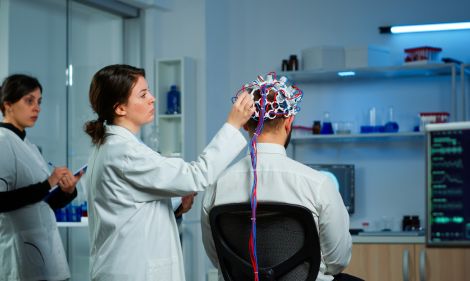Traumatic Brain Injuries After Car Accidents: Complete Guide to Diagnosis & Treatment
Car accidents can change lives in an instant. Among the most devastating consequences are traumatic brain injuries (TBIs). While some injuries are obvious, head trauma is often invisible at first, making it especially dangerous.
According to the Centers for Disease Control and Prevention (CDC), car accidents are one of the leading causes of TBIs in the U.S., affecting thousands of people every year. These injuries can range from mild concussions to life-threatening brain bleeds.

In this detailed guide, we’ll cover:
- Types of traumatic brain injuries after car accidents
- Symptoms and warning signs to never ignore
- How doctors diagnose head injuries
- Advanced treatment and recovery options
- Long-term effects and prevention tips
Types of Traumatic Brain Injuries in Car Accidents
Not all head injuries are the same. Here are the most common TBIs caused by auto accidents:
- Concussion (Mild TBI)
- Caused by a sudden jolt or blow to the head
- Symptoms: headache, dizziness, confusion, blurred vision
- Usually temporary but may cause post-concussion syndrome
- Caused by a sudden jolt or blow to the head
- Contusion (Brain Bruise)
- Direct impact to the head causes bleeding inside the brain
- Severe cases may need surgery
- Direct impact to the head causes bleeding inside the brain
- Skull Fractures
- Broken bones in the skull can damage brain tissue
- Types: linear, depressed, diastatic, or basilar fractures
- Broken bones in the skull can damage brain tissue
- Hematomas (Blood Clots)
- Pools of blood that increase pressure inside the skull
- Can be epidural, subdural, or intracerebral hematomas
- Pools of blood that increase pressure inside the skull
- Diffuse Axonal Injury (DAI)
- Caused by violent shaking or rotational force
- Severe cases may lead to coma or permanent disability
- Caused by violent shaking or rotational force
Causes of Brain Injuries in Car Accidents
Brain injuries occur due to the force of impact during crashes. Common causes include:
- Striking the steering wheel, window, or dashboard
- Rapid whiplash-like movement that causes the brain to hit the skull
- Airbag deployment at high speed
- Flying glass or debris
- Ejection from the vehicle
Even low-speed collisions can cause concussions or internal bleeding.
Warning Signs & Symptoms to Watch Out For
Head injuries don’t always show immediate symptoms. Some may appear hours or days later.
Physical Symptoms:
- Severe or persistent headaches
- Blurred or double vision
- Dizziness or loss of balance
- Nausea and vomiting
- Seizures
Cognitive & Behavioral Symptoms:
- Confusion or memory loss
- Difficulty concentrating
- Slurred speech
- Mood swings, irritability, or depression
- Loss of consciousness (even briefly)
If you experience these symptoms after an accident, seek emergency medical care immediately.
Diagnosis of Traumatic Brain Injuries
Doctors use a combination of tests to confirm TBIs:
- Neurological exams to check reflexes, coordination, and mental function
- CT scans to detect bleeding or fractures
- MRI scans for detailed imaging of brain tissue
- Glasgow Coma Scale (GCS) to assess severity of brain injury
Treatment Options
Treatment depends on the severity of the TBI:
Mild TBIs (Concussions)
- Rest and limited screen time
- Medications for headaches
- Monitoring for worsening symptoms
Moderate TBIs
- Medications to reduce brain swelling
- Anti-seizure drugs
- Oxygen therapy if needed
Severe TBIs
- Surgery to remove blood clots or relieve pressure
- Skull repair for fractures
- Ventilation support for critical patients
At Specialty Care Clinics, we provide comprehensive head injury treatment, from immediate care to long-term rehabilitation.
Rehabilitation & Recovery
Recovery from a brain injury often requires multidisciplinary rehabilitation, including:
- Physical therapy to restore movement and coordination
- Speech therapy for communication issues
- Occupational therapy to regain independence in daily tasks
- Neuropsychology & counseling for emotional support
Recovery times vary:
- Concussions: Weeks to months
- Moderate TBIs: Months with therapy
- Severe TBIs: Ongoing care, sometimes lifelong
Complications of Traumatic Brain Injuries
If untreated, TBIs can lead to:
- Permanent cognitive impairment
- Memory loss
- Chronic headaches
- Seizure disorders
- Behavioral or personality changes
- Increased risk of dementia later in life
Prevention Tips
While accidents are unpredictable, some steps can lower risk:
- Always wear a seatbelt
- Use airbags correctly
- Ensure children are in appropriate car seats
- Avoid distractions like texting while driving
- Drive at safe speeds and follow traffic rules
Conclusion
Traumatic brain injuries after car accidents are serious and potentially life-changing. From concussions to severe TBIs, immediate diagnosis and treatment are crucial for preventing long-term complications.
At Specialty Care Clinics, our team specializes in head injury treatment after Car Accident, helping patients recover both physically and emotionally.
FAQs
- What is the most common brain injury in car accidents?
Concussions are the most common, caused by sudden jolts or impacts. - Can symptoms of a TBI appear days later?
Yes, some symptoms—like memory loss or headaches—may appear hours or days after the accident. - How long does recovery from a traumatic brain injury take?
Recovery can take weeks for mild TBIs and months to years for severe cases. - Can TBIs cause permanent damage?
Yes, severe TBIs may result in lasting memory, speech, or movement difficulties. - Where can I find expert TBI treatment in Texas?
Visit Specialty Care Clinics for specialized diagnosis, treatment, and rehabilitation care.
